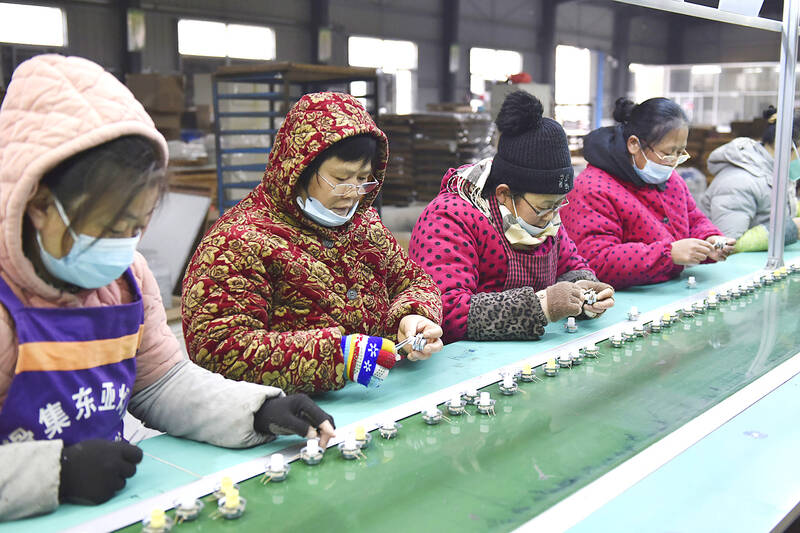China’s factory activity shrank at the sharpest pace since the COVID-19 pandemic first emerged about three years ago, after Beijing’s abrupt reversal of counter-epidemic measures last month set off a wave of COVID-19 infections across the country.
The official purchasing managers’ index (PMI) fell to 47.0 last month from 48.0 in November, the National Bureau of Statistics said on Saturday.
Economists in a Reuters poll had expected the PMI to come in at 48.0. The 50-point mark separates contraction from growth on a monthly basis.

Photo: AP
The drop was the biggest since the early days of the pandemic in February 2020.
The data offered the first official snapshot of the manufacturing sector after China removed the world’s strictest COVID-19 restrictions last month. Cumulative infections likely reached 18.6 million last month, UK-based health data firm Airfinity said.
Analysts said surging infections could cause temporary labor shortages and increased supply chain disruptions.
Weakening external demand on the back of growing global recession fears amid rising interest rates, inflation and Russia’s invasion of Ukraine could further slow China’s exports, hurting its massive manufacturing sector and hampering an economic recovery, they said.
“Most factories I know are way below where they could be this time of year for orders next year. A lot of factories I have talked to are at 50 percent, some are below 20 percent,” said Cameron Johnson, a partner at Tidal Wave Solutions, a supply chain consulting firm.
“So even though China is opening up, manufacturing is still going to slow down because the rest of the world’s economy is slowing down. Factories will have workers, but they will have no orders,” Johnson said.
The bureau said 56.3 percent of surveyed manufacturers reported that they were greatly affected by the epidemic last month, up 15.5 percentage points from the previous month, although most also said they expect the situation to gradually improve.
In 2021, inflation-adjusted GDP reached 114.92 trillion yuan (US$16.66 trillion), up 8.4 percent from 2020. GDP expanded 3 percent in the first nine months of last year, compared with China’s official full-year goal of around 5.5 percent.
The World Bank expects growth for last year of 2.7 percent.
The non-manufacturing PMI, which looks at services sector activity, fell to 41.6 from 46.7 in November, the bureau’s data showed, also marking the lowest reading since February 2020.
The official composite PMI, which combines manufacturing and services, declined to 42.6 from 47.1.
“The weeks before Chinese New Year are going to remain challenging for the service sector as people won’t want to go out and spend more than necessary for fear of catching an infection,” Capital Economics head Asia economist Mark Williams said.
“But the outlook should brighten around the time that people return from the Chinese New Year holiday — infections will have dropped back, and a large share of people will have recently had COVID and feel they have a degree of immunity,” he said.

SEMICONDUCTORS: The German laser and plasma generator company will expand its local services as its specialized offerings support Taiwan’s semiconductor industries Trumpf SE + Co KG, a global leader in supplying laser technology and plasma generators used in chip production, is expanding its investments in Taiwan in an effort to deeply integrate into the global semiconductor supply chain in the pursuit of growth. The company, headquartered in Ditzingen, Germany, has invested significantly in a newly inaugurated regional technical center for plasma generators in Taoyuan, its latest expansion in Taiwan after being engaged in various industries for more than 25 years. The center, the first of its kind Trumpf built outside Germany, aims to serve customers from Taiwan, Japan, Southeast Asia and South Korea,

Gasoline and diesel prices at domestic fuel stations are to fall NT$0.2 per liter this week, down for a second consecutive week, CPC Corp, Taiwan (台灣中油) and Formosa Petrochemical Corp (台塑石化) announced yesterday. Effective today, gasoline prices at CPC and Formosa stations are to drop to NT$26.4, NT$27.9 and NT$29.9 per liter for 92, 95 and 98-octane unleaded gasoline respectively, the companies said in separate statements. The price of premium diesel is to fall to NT$24.8 per liter at CPC stations and NT$24.6 at Formosa pumps, they said. The price adjustments came even as international crude oil prices rose last week, as traders

SIZE MATTERS: TSMC started phasing out 8-inch wafer production last year, while Samsung is more aggressively retiring 8-inch capacity, TrendForce said Chipmakers are expected to raise prices of 8-inch wafers by up to 20 percent this year on concern over supply constraints as major contract chipmakers Taiwan Semiconductor Manufacturing Co (TSMC, 台積電) and Samsung Electronics Co gradually retire less advanced wafer capacity, TrendForce Corp (集邦科技) said yesterday. It is the first significant across-the-board price hike since a global semiconductor correction in 2023, the Taipei-based market researcher said in a report. Global 8-inch wafer capacity slid 0.3 percent year-on-year last year, although 8-inch wafer prices still hovered at relatively stable levels throughout the year, TrendForce said. The downward trend is expected to continue this year,

Taiwan Semiconductor Manufacturing Co (TSMC, 台積電), which supplies advanced chips to Nvidia Corp and Apple Inc, yesterday reported NT$1.046 trillion (US$33.1 billion) in revenue for last quarter, driven by constantly strong demand for artificial intelligence (AI) chips, falling in the upper end of its forecast. Based on TSMC’s financial guidance, revenue would expand about 22 percent sequentially to the range from US$32.2 billion to US$33.4 billion during the final quarter of 2024, it told investors in October last year. Last year in total, revenue jumped 31.61 percent to NT$3.81 trillion, compared with NT$2.89 trillion generated in the year before, according to